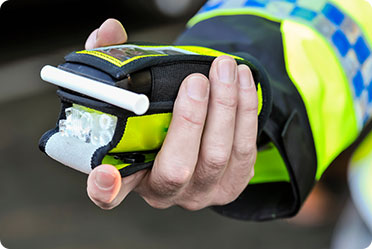
If you have been charged with a DUI or DWI, there are various ways the reliability of breath testing results should be challenged. One particular attack concerns the presence of dental appliances or fixtures, such as dentures or bridges, during breath testing. The ability of these fixtures to trap alcohol in the mouth can cause a falsely elevated reading that will be used to wrongly convict a driver for having a breath alcohol reading (BAC) over the legal limit.
Food or other foreign substances, such as chewing tobacco, often become lodged under bridges, plates or dentures. When a person has been drinking alcohol, the substances trapped under the dental fixtures will absorb the alcohol. These substances soaked in alcohol may then be present during the breath testing, causing the presence of “mouth alcohol.” Even a minute amount of this unabsorbed, mouth alcohol can mix with a breath sample.
Although manufacturers of modern breath testing devices claim these machines are equipped with detectors that will alert the operator to the presence of mouth alcohol, many experts have disputed the reliability of these detectors. As such, the breath testing machines are often unable to distinguish between the unabsorbed alcohol in a person’s mouth and the alcohol that has been absorbed into the subject’s bloodstream. This inability to distinguish between the two could lead to disastrous results for the person charged with a DUI.
Two studies in particular have addressed the issue of dentures, mouth alcohol and breath testing. In 1992, the American Society for Testing and Materials published a study that acknowledged the use of dentures and denture adhesive can cause alcohol to remain in the oral cavity for an extended period of time. The study did conclude that after 20 minutes the alcohol would have sufficiently dissipated, so it was not detected by the breath testing machine. However, that study did not address whether the presence of food substances or tobacco could cause alcohol to remain in the mouth for longer than a 20-minute period.
The second study (case report) published in 1994 by the Journal of Analytical Toxicology concluded that a bridge or periodontal space could trap mouth alcohol and cause an artificially inflated breath test reading.
Pennsylvania and New Jersey both require that a breath test operator conduct a 20-minute observation period prior to testing a subject in order to ensure that mouth alcohol has dissipated. Nonetheless, the presence of dental fixtures and foreign substances in the mouth could certainly interfere with the reliability of the breath testing results.
Based on these studies, a person charged with a DUI or DWI who has dental fixtures should make his or her attorney aware of this condition. Of course, a qualified and experienced DUI attorney will always ask a client questions concerning dental issues prior to being advised by the client. Once the attorney is aware of these issues, a breath testing expert can be consulted in order to help construct a defense.
Leckerman Law focuses on safeguarding the
rights of individuals charged with DUI, DWI, DAI, and
other alcohol-related criminal offenses - Call Us Now For
NJ DWI (856) 429-2323 | For PA DUI (215) 496-9292